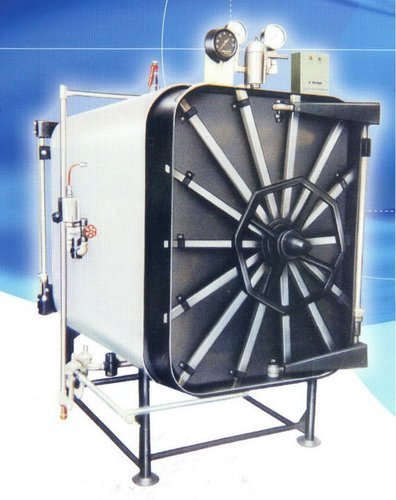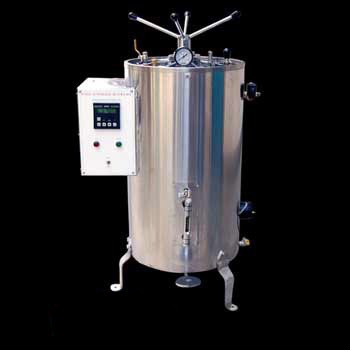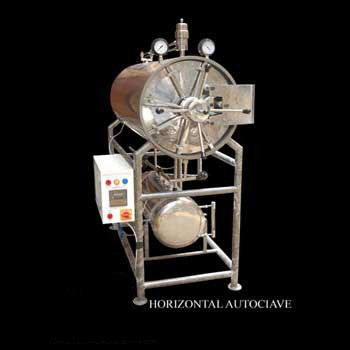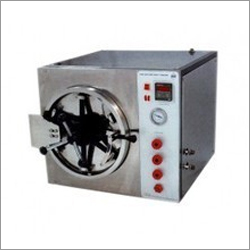Stainless Steel Cement Autoclaves
Stainless Steel Cement Autoclaves Specification
- Voltage
- 240 Volt (v)
- Power
- 50 Watt (w)
- Weight
- 50-70 Upto Kilograms (kg)
- Usage
- Use For Industrial And Laboratory
- Application
- Industrial
- Material
- Stainless Steel
- Product Type
- Autoclave
Stainless Steel Cement Autoclaves Trade Information
- Minimum Order Quantity
- 1 Piece
- Payment Terms
- Letter of Credit (L/C), Letter of Credit at Sight (Sight L/C), Telegraphic Transfer (T/T)
- Supply Ability
- 10 Pieces Per Month
- Delivery Time
- 1 Week
- Main Export Market(s)
- Western Europe, Asia, Australia, North America, Eastern Europe, Middle East, Central America, South America, Africa
- Main Domestic Market
- All India
About Stainless Steel Cement Autoclaves
Stainless Steel Cement Autoclaves
We are engaged in manufacturing and exporting a wide range of Cement Autoclaves. These products includes a stainless steel cylinder with a welded heat insulated voer that is confined in a heat insulated metal housing, mounted on a sturdy supporting frame. In order to control the electric heating units, the attached control unit holds in a sensitive pressure regulator, pressure gauze, power switches and pilot lights. In addition to this, to hold specimens above water level in a vertical position and autoclave, laboratory cement autoclave is offered by us with test bar holder and special rack to expose them in the same manner.
Technical specifications:-
- Inside chamber dimensions are 10.5 cm diameter x 40.5 cm height
- The device is suitable for operation on 230 V, 50 Hz, single phase A.C. supply.
Precision Testing for Cement Applications
These stainless steel cement autoclaves are essential for conducting accelerated soundness tests in industrial and laboratory settings. Built to withstand high temperatures and pressures, the autoclaves ensure that cement samples are tested accurately for quality assurance and compliance with standards. Their solid construction and precise controls make them indispensable in the cement industry.
Advanced Durability and Reliability
Crafted from premium stainless steel, our cement autoclaves offer excellent durability against corrosion and repeated use. Their robust design ensures consistent performance, even in demanding industrial environments. They are suited for intensive testing cycles, minimizing downtime and maintenance costs due to their reliable engineering.
FAQs of Stainless Steel Cement Autoclaves:
Q: How do stainless steel cement autoclaves operate in industrial and laboratory settings?
A: Stainless steel cement autoclaves function by maintaining controlled pressure and temperature conditions to test the soundness of cement samples. These controlled environments help determine the durability and quality of cement used in construction. The autoclave is simple to use, requiring proper loading of samples and setting of operational parameters.Q: What are the key benefits of using stainless steel autoclaves for cement testing?
A: The primary benefit is their resistance to corrosion and high durability, thanks to stainless steel construction. Additionally, these autoclaves provide accurate and reliable test results, ensuring quality control and conformity to industry standards in both laboratories and industrial plants.Q: When should cement samples be tested using an autoclave?
A: Cement samples should be subjected to autoclave testing during routine quality control or when verifying compliance with technical specifications. This is typically done before the cement is deployed in large-scale construction projects to avoid structural issues later.Q: Where are stainless steel cement autoclaves commonly used in India?
A: These autoclaves are widely utilized in cement manufacturing industries, quality control laboratories, research institutions, and industrial testing facilities throughout India. They support both domestic and export-quality assurance needs.Q: What is the process for conducting a cement test using these autoclaves?
A: The process involves preparing the cement sample, placing it inside the autoclave chamber, and then applying specific temperature and pressure for a set duration. After the test cycle, the sample is examined to assess its expansion and integrity, ensuring it meets required standards.Q: How does the power and voltage specification support optimal usage?
A: Operating at 50 watts and 240 volts, these autoclaves offer energy-efficient performance while maintaining the necessary power for consistent and effective cement testing results, suitable for both industrial and laboratory environments.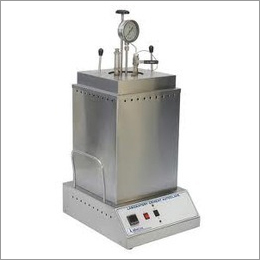

Price:
- 50
- 100
- 200
- 250
- 500
- 1000+
More Products in AUTOCLAVES Category
Horizontal Rectangular Autoclave Deluxe Model
Price Range 30000.00 - 300000.00 INR / Piece
Minimum Order Quantity : 1 Piece
Application : Industrial
Usage : Use For Industrial And Laboratory
Product Type : Autoclave
Material : Stainless Steel
Vertical Autoclaves
Price Range 12000.00 - 40000.00 INR / Piece
Minimum Order Quantity : 1 Piece
Application : Industrial
Usage : Use For Industrial And Laboratory
Product Type : Autoclave
Material : Stainless Steel
Horizontal Autoclaves
Price Range 50000.00 - 90000.00 INR / Piece
Minimum Order Quantity : 1 Piece
Application : Industrial
Usage : Use For Industrial And Laboratory
Product Type : Autoclave
Material : Stainless Steel
Table Top Autoclaves
Price Range 20000.00 - 80000.00 INR / Piece
Minimum Order Quantity : 1 , , Piece
Application : Industrial
Usage : Use For Industrial And Laboratory
Product Type : Autoclave
Material : Stainless Steel

 Send Inquiry
Send Inquiry Send Inquiry
Send Inquiry
